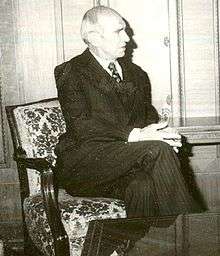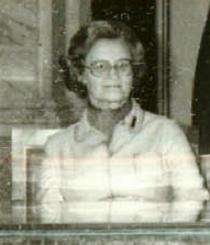Rudolf Kirchschläger
Rudolf Kirchschläger, GColIH (German: [ˈʁuːdɔlf ˈkɪʁçˌʃlɛːɡɐ] (![]()
Rudolf Kirchschläger | |
|---|---|
 | |
| President of Austria | |
| In office 8 July 1974 – 8 July 1986 | |
| Chancellor | Bruno Kreisky Fred Sinowatz Franz Vranitzky |
| Preceded by | Franz Jonas |
| Succeeded by | Kurt Waldheim |
| Personal details | |
| Born | 20 March 1915 Niederkappel, Upper Austria, Austro-Hungarian Empire |
| Died | 30 March 2000 (aged 85) Vienna, Austria |
| Spouse(s) | Herma Kirchschläger (1940–2000) |
| Children | 2 |
| Profession |
|
Early life and education
Born in Niederkappel, Upper Austria, Kirschläger was orphaned at the age of 11. He graduated from high school in Horn in 1935 with distinction and started to study law at the University of Vienna. However, after the Anschluss of Austria in 1938, he had to give up his studies. Without joining the NSDAP, which he refused to do, his scholarship was revoked and Kirchschläger could not finance his studies any longer. Kirchschläger worked as a bank clerk in 1938 until he was drafted to service in the infantry of the Wehrmacht in the summer of 1939. Kirchschläger fought as a soldier from the very beginning of the war, first during the invasion of Poland, later on the Western Front, and after 1941 against Russia on the Eastern Front.
In late 1940, in order to get out of the military, he used a two-month front-leave to prepare for the final exam (Staatsexamen) of his law studies. Legend has it that he was working up to 20 hours a day, while keeping himself awake with large amounts of honey. Subsequently, he passed the exams and graduated to Doctor iuris.
However, he was sent back to the Eastern Front, where he was wounded in 1942. Towards the end of war, he was captain and training officer at the military academy at Wiener Neustadt in the Vienna region. In early April 1945, commanding a company of cadets fighting approaching Soviet troops, he was badly wounded on his leg, an injury from which he never fully recovered.
Post-WW2
After the war, Kirchschläger worked as a district judge until 1954 in Langenlois and later Vienna. In 1954, he got the chance to work in the Ministry of Foreign Affairs, although he did not speak any foreign languages. In order to take part in the negotiations on the Austrian State Treaty, he taught himself English in only a few months. From 1967 until 1970, he was ambassador in Prague. Despite orders not to do so, he issued exit visas to Czech citizens who tried to flee from the Communists during the Soviet invasion of Czechoslovakia. From 1970-74 he was Minister of Foreign Affairs.
Presidency
Kirchschläger was elected President of Austria in 1974. In a programmatic lecture at Innsbruck University in February 1971 he outlined his understanding of an "ethical foreign policy". In 1974, he issued a pardon to convicted Austrian Nazi war criminal Franz Novak, who had coordinated the railroad deportation of European Jews to concentration and extermination camps.[1]
In 1980 he was elected for a second term with an approval rate of 80%, the highest rate ever obtained in any presidential elections. In February 1984, he paid the first state visit of an Austrian President to the United States.[2][3]
Family

He was married to Herma Sorger (born 15 May 1916, Vienna – died 30 May 2009, Vienna) from 17 August 1940[4] until his death; they had two children: Christa (born 14 August 1944) and Walter (born 27 April 1947).[5][6][7]
Death
Rudolf Kirchschläger died of a heart attack on March 30, 2000 near Vienna, aged 85.[8]
Honours
Austrian Honours

Foreign Honours







_BAR.svg.png)

Literature
- Rudolf Kirchschläger, Der Friede beginnt im eigenen Haus. Gedanken über Österreich. Vienna: Molden (1980); ISBN 3-217-01070-1
- Rudolf Kirchschläger, Ethik und Außenpolitik Hans Köchler (ed.), Philosophie und Politik. Dokumentation eines interdisziplinären Seminars. Innsbruck: Arbeitsgemeinschaft für Wissenschaft und Politik, pp. 69–74 (1973)
- Alois Mock, Herbert Schambeck (Hrsg.): Verantwortung in unserer Zeit. Festschrift für Rudolf Kirchschläger. Österreichische Staatsdruckerei, 1990.
- Rabl, Erich: Rudolf Kirchschläger (1915-2000), Jurist, Diplomat, Außenminister und Bundespräsident. In: Harald Hitz, Franz Pötscher, Erich Rabl, Thomas Winkelbauer (Hg.): Waldviertler Biographien, Bd. 3, Horn (Waldviertler Heimatbund) 2010, S. 399–428. ISBN 3-900708-26-6.
- Schenz, Marco: Bundespräsident Rudolf Kirchschläger. Böhlau-Verlag, Wien 1984.
References
- "Holocaust und Kriegsverbrechen vor Gericht: Der Fall Österreich". Studienverlag. Retrieved 21 July 2015.
- "Visits to the U.S. by Foreign Heads of State and Government—1984". Bureau of Public Affairs. Retrieved 14 March 2009.
- "Remarks of President Reagan and President Rudolf Kirchschläger of Austria at the State Dinner". Ronald Reagan Presidential Library. 28 February 1984. Retrieved 14 March 2009.
- Senta Ziegler: Österreichs First Ladies. Wien. Ueberreuter 1999
- "Herma Kirchschläger ist tot" (in German). DiePresse.com. 30 May 2009. Retrieved 30 May 2009.
- Senta Ziegler. "Österreichs First Ladies". Wien. Ueberreuter 1999
- Saxon, Wolfgang (31 March 2000). "Rudolf Kirchschlager, 85, Judge Who Became Austria's President". The New York Times. Retrieved 14 March 2009.
- "Le onorificenze della Repubblica Italiana". www.quirinale.it. Retrieved 27 August 2019.
- Jean Schoos: Die Orden und Ehrenzeichen des Großherzogtums Luxemburg und des ehemaligen Herzogtums Nassau in Vergangenheit und Gegenwart. Verlag der Sankt-Paulus Druckerei AG. Luxemburg 1990. ISBN 2-87963-048-7. S. 344.
- Boletín Oficial del Estado
- Boletín Oficial del Estado
- "Cidadãos Estrangeiros Agraciados com Ordens Portuguesas". Página Oficial das Ordens Honoríficas Portuguesas. Retrieved 4 August 2017.
- AAS 82 (1990), Heft 12, S. 1463.
- AAS 93 (2001), Heft 8, S. 563.